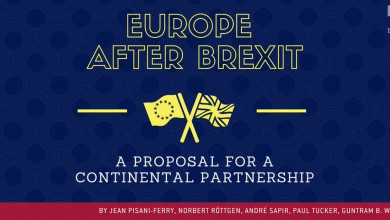Theresa May’s recently announced that she will trigger Article 50 no later than March 2017. Guntram Wolff debriefs May’s speech and the implications for the future of EU-UK relations. This op-ed was orignally published in Nikkei Veritas “Market Eye” and Bruegel. It was also published in Rzeczpospolita, Nikkei Asian Review, Expansion and in La Stampa.
Theresa May has finally spoken. In a major speech, she has set out her plans to trigger Article 50 and negotiate Brexit. The announcement has brought clarity on the timetable for negotiations, which will start no later than March 2017 and probably last for 2 years. But May also gave the clearest information yet about the British government’s aims, setting out some key “red lines”. Of course, such lines are drawn in sand, not stone, and they can change in the course of negotiations. But compromise is politically difficult, so we should expect the UK to fight for its position. It is therefore worth unpacking what these red lines imply for the future of EU-UK relations. The signs are not good those for those who support a “soft Brexit”.
The first and most important point is about sovereignty. As Prime Minister May puts it: “We are going to be a fully-independent, sovereign country, a country that is no longer part of a political union with supranational institutions that can override national parliaments and courts.” And she continues: “We will be free to pass our own laws….And we are not leaving only to return to the jurisdiction of the European Court of Justice.” These statements are clear and have clear implications for the nature of the future relation between the EU and the UK. There cannot be anything even closely resembling the deep integration of the single market.Far-reaching integration like the single market needs much more than a shared set of standards and rules. It also needs a uniform enforcement of these rules through supranational institutions like the European Court of Justice and the European Commission.
Far-reaching integration like the single market needs much more than a shared set of standards and rules.
This is not just a theoretical observation but an issue with immediate economic consequences. So-called passporting (the ability to provide banking services across borders) is only conceivable within a supranational jurisdiction. And it is not only financial services that are concerned. In many other sectors, such as healthcare, it is shared standards and their enforcement that are most important in facilitating international trade — not tariffs, which are already low. Just as vital is the supranational surveillance of competition and state aid, without which unfair competition and dumping can become a real threat to business and consumers.
What other arrangement is possible? One obvious alternative is a free trade agreement.
Since anything closely resembling single market membership has been excluded by the British PM’s choice of red lines, one question naturally arises. What other arrangement is possible? One obvious alternative is a free trade agreement. The PM immediately mentioned the mantra of “Global Britain”. But with almost 48% of UK goods exports going to the EU, the first priority for the UK would surely be to forge a deal with the EU. Such a deal would exclude large parts of the services sector, in which the UK is relatively strong. But the UK’s hand will be weakened further by the fact that no EU country sends more than 14% of their total exports to the UK. The EU could well try to leverage that relative strength in negotiations.
The negotiations for the CETA agreement with Canada started more than seven years ago.
However, there are also potential pitfalls on the EU side. Even in a scenario where the EU institutions were willing to engage with the UK and develop a mutually-beneficial trade deal, no outcome can be guaranteed. For a start, trade negotiations can take a long time. The negotiations for the CETA agreement with Canada started more than seven years ago. Moreover, even with cooperative EU institutions, it is far from certain that any trade deal would be implemented. Although EU law formally gives the EU an exclusive competence on trade negotiations, this supremacy is now in question. In particular, after the European Commission’s decision to allow all EU member states to pre-approve the CETA deal, it has become unclear whether the EU is actually still able to forge meaningful new trade deals. As a consequence, Britain may leave the EU without a new trade deal in place, and with uncertain prospects of a new deal anytime soon.
The consequences of such a “hard divorce” could be painful for business and citizens, but there are also some reasons for hope. The PM has announced that the British government will enact a law to incorporate all EU law into UK law. That could offer the basis of an interim trade agreement. However, the UK would have to fully follow EU law to minimise disruptions until a new arrangement was agreed. In this case, of course, the UK’s regained “sovereignty” would remain an illusion.

